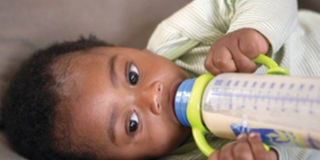Premium
Baby formula shortage hits Kenya as prices triple

A baby drinks milk out of a bottle: A spot check at supermarkets in the Nairobi Central Business District shows that there is indeed no baby formula on the shelves.
As mothers in the country complain of infant formula shortage amid soaring prices, the Health ministry says the scarcity will boost children's nutrition for parents who will embrace exclusive breast feeding.
A spot check at supermarkets in the Nairobi city centre shows there is no baby formula. At online stores and pharmacies, shoppers are met with ‘out-of-stock’ for most formula brands, while for the few that are in stock, the prices have more than tripled.
A pharmacist in Nairobi on Wednesday told the Nation that there has been a severe shortage since December.
“We have been struggling to get supplies. Prices have shot up from Sh900 to about Sh3,000. I am told that the shortage is because of recent guidelines by the Health ministry on baby formula,” he said.
Ms Diana Arisa, the mother of a four-month-old baby, told the Nation that any time she goes to buy baby formula, she is told the government stopped is April.
“It is demoralising to see shelves in the supermarket empty, and, in case one is lucky to find the baby formula, it is sold at double price or more. It’s quite challenging. I resorted to using a breast pump,” she told the Nation.
In May last year, an uproar over new regulations by the Health ministry, which was misinterpreted at first, saw mothers panic over feeding bottles and infant formula.
The Breast Milk Substitutes (Regulation and Control) Act, 2012 was enacted in the same month and it reinforced the need for having stringent directives on marketing of baby formula, teats, pacifiers and infant bottles.
The law stipulates that in order to fulfill paediatric nutrition needs, an infant’s best interest has to be at the forefront of items sold in the country.
“Where appropriate, breast milk substitutes and prepackaged complementary food shall be safe for the consumption of an infant and young child,” says a section of the Act.
It is an amendment of the Act that was first passed in 2012.
While making the announcement last year, director of Medical Services, Preventive and Promotional Health in the ministry Andrew Mulwa said the government planned to regulate the sale, promotion and advertisement of breast milk substitutes, while engaging with industry players and health workers to streamline ethical marketing.
This is also stipulated in the law.
“Interaction with manufacturers and distributors of designated products shall be done in the manner prescribed under the Act and these Regulations,” indicates the Act.
In 1981, the country became the first to vote for a global agreement by the World Health Organisation that led to the birth of the International Code of Marketing of Breast-Milk Substitutes.
Its role is to ensure that there is a safe and coordinated way of promoting what babies feed on in a bid to promote exclusive breastfeeding and appropriate use of breast-milk alternatives.
Dr Mulwa told the Nation that he is not aware of the shortage, but he suspects the impact of the law that was enforced last year is slowly being felt.
"I don't know whether there are other market issues but maybe it could be linked to the new law which discourages the sale of breast milk substitutes. The desired outcome is taking effect because we recommend exclusive breastfeeding," he said.
"Just like the Tobacco Control Act that was enforced about 10 years ago, we will not stop the sale but limit it for the sake of our children's health," he explained.
Globally, however, reports on shortage have also been in the media and they link it to closure of some companies during the Covid-19 pandemic.
In the United States, the White House made an official address last year, promising to intensify production of baby formula.
“President Biden knows that parents across the country are worried about finding infant formula to feed their babies, which is why he has directed his administration to do everything possible to ensure that there is enough safe infant formula in the country available for families that need it,” showed an official statement from the White House.
A giant US factory that almost dominates baby formula supply was shut down last year on allegations of the presence of a bacteria called Cronobacter that led to the deaths of at least two infants.
In Canada, the government addressed the shortage earlier this year, promising to work with manufacturers and ensure that supply is restored, especially for hospital and special medical use.
Unless for medical use or special circumstances, paediatric nutritionist Grace Muteti advises that exclusive breastfeeding is better than infant formula.
“Breast milk nutrients are well absorbed by infants and they have daily requirements for a child such as water, so it also quenches their thirst. The breast has enough milk. Most formulas are made of cow milk, which sometimes may cause digestion issues and not all nutrients may be absorbed,” she told the Nation.
“Some of the baby formulas can also cause allergic reactions, especially to lactose. Most people may not know, but breast feeding is a natural contraceptive,” she added.





